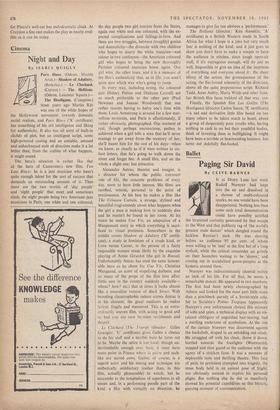Cinema
Night and Day
By ISABEL QUIGLY Paris Blues. (Odeon, Marble Arch.)—Shadow of Adultery.
(Curzon.) — The Hellions.
(Odeon, Leicester Square.)— The Hooligans. (Compton.) Sow. years ago Martin Ritt was one of the white hopes of the Hollywood movement towards domestic social realism, and Paris Blues (A' certificate) has something of his old intelligence and liking for authenticity. It also has all sorts of built-in clichés of plot, but an intelligent script, some high-powered casting and an amiable, amused and unhackneyed style of direction make it a lot better than, from the outline of what happens, it might sound.
The hero's situation is rather like that of the hero of Cassavetes's new film, Too Late Blues: he is a jazz musician who hasn't quite enough talent for the sort of success that demands an outstanding amount of it. Then there are the two worlds of 'day people' and 'night people' that meet and sometimes clash, the night people being two American jazz musicians in Paris, one white and one coloured, the day people two girl tourists from the States, again one white and one coloured, with the ex- pected complications and fallings-in-love. And there are two struggles, between (roughly) genius and domesticity—the divorcée with two children who hopes to marry the white musician—and colour in two continents—the American coloured girl who hopes to bring the now thoroughly. Parisian coloured musician home again. One girl wins, the other loses; and it is a measure of the film's authenticity that, as in life, you aren't quite sure which way who's going to jump.
In every way, including acting, the coloured pair (Sidney Poitier and Diahann Carroll) are so much preferable to the other pair (Paul Newman and Joanne Woodward) that one rather resents having to halve one's time with them. Louis Armstrong is around for a few mar- vellous moments, and Paris is affectionately, if rather obviously, photographed. One moment of real, though perhaps unconscious, pathos is achieved when a girl tells a man that he'll never manage to get away from the memory of her, she'll haunt him for the rest of his days—when we know, as clearly as if it were written in six- foot letters, that he's going to walk down the street and forget her. A small film, and on the whole a slight one; but attractive.
Alexandre Astruc, theorist and imagist, is a director for whom the public. extrovert side of life, the concrete problems of every day, seem to have little interest. His films are rarefied, remote, personal to the point of preciousness. At his best he makes a film like The Crimson Curtain, a strange, stylised and beautiful tragi-comedy about what happens when the girl a man is making love to suddenly dies and he mustn't be found in her room. At his worst he makes Une Vie, an adaptation of a Maupassant story in which everything is sacri- ficed to visual prettiness. Somewhere in the middle comes Shadow of Adultery ('X' certifi- cate), a study in feminism of a crude kind, or Love versus Career, in the person of a fairly impossible woman made likely by the exquisite playing of Annie Girardot (the girl in Rocco). Unfortunately Astruc has used the same lament- able hero as he chose for Line Vie, Christian Marquand, an actor of stupefying dullness, and so many of the props of the film love affair (little nest in the country suddenly available— whose? how? etc.) that at times it looks almost like a masculine version of Back Street. With brooding claustrophobic indoor scenes Astruc is in his element; the great outdoors he makes lyrical, fragile and mannered. This is an extra- ordinarily uneven film, with acting so good and so bad you are torn between ravishment and despair.
Le Clochard (The Tramp) (director : Gilles Grangier; 'U' certificate) gives Gabin a chance to do his stuff and a terrible bore he turns out to be. Maybe the satire is too local; though un- derstandable enough over here, it must have more point in France where la gloire and such- like are sacred cows. Gabin, of course, is a superb actor and his timing and technique are testhetically satisfactory (rather than, in this film, actually pleasurable) to watch; but he succumbs to the temptations of superbness in all senses and, in a performing poodle part of the kind, a film with virtually no direction, he manages to give far too obvious a 'performance.'
The Hellions (director : Ken Annakin; 'A' certificate) is a British Western made in South Africa for what I hope is a joke but very much fear is nothing of the kind; and it just goes to show you don't have to make a weepie to have the audience in stitches, since tough open-air stuff, if it's outrageous enough, will do just as well. Impossible to give an idea of the ineptness of everything and everyone about it: the sheer idiocy of the action, the grotesqueness of the acting, the flat-footed solemnity of the direction, above all the quite preposterous script. Richard Todd, Anne Aubry, Marty Wilde and other fami- liar British film faces trekked all that way, too.
Finally, the Spanish film Los Golfos (The Hooligans) (director Carlos Saura; 'X' certificate) —a sad and derivative little film based on too many others to be taken much to heart, about a group of desperately poor youths who, having nothing to cash in on but their youthful bodies, think of investing them in bullfighting. It might have been a terrible or heartrending business, but turns out dolefully flat-footed.










































 Previous page
Previous page